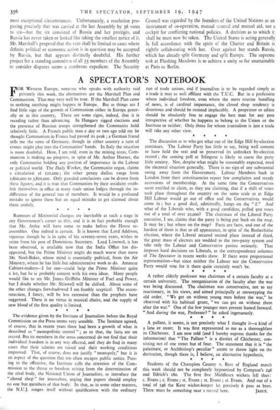The evidence given by the Institute of Journalists before the
Royal Commission on the Press seems very sensible. The Institute agreed, of course, that in recent years there had been a growth of what is described as "monopolistic control " ; as to that, the facts are on record. But its members in the areas concerned do not find that their individual freedom is in any way affected, and they do find in many cases that their salaries are raised and their working conditions improved. That, of course, does not justify "monopoly," but it is an aspect of the question that too often escapes public notice. Pass- ing to the offensive, the Institute calls the attention of the Com- mission to the threat to freedom arising from the determination of the rival body, the National Union of Journalists, to introduce the "closed shop" for journalists, urging that papers should employ no one but members of that body. In that, as in some other matters, the N.U.J. ranges itself without qualification with the ordinary
run of trade unions, and if journalism is to be regarded simply as a trade it may as well affiliate with the T.U.C. But in a profession where individual freedom, even where the mere routine handling of news, is of cardinal importance, the closed shop tendency is disastrous and should be resisted implacably. A proprietor or editor should be absolutely free to engage the best man for any post irrespective of whether he happens to belong to the Union or the Institute or neither. Only those for whom journalism is just a trade will take any other view.


































 Previous page
Previous page